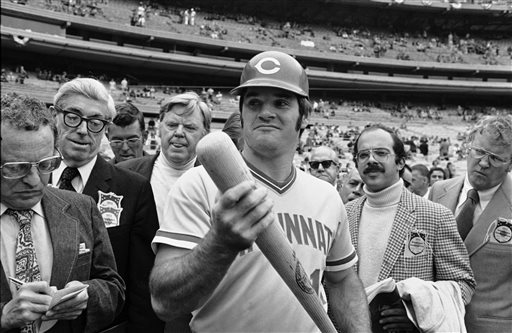By Chad Jennings

There will be no shortage of Pete Rose columns written this afternoon. I’ll present this one from Bob Nightengale of USA Today:
—
This is it for Pete Rose.
The end.
His baseball fate finally is over.
He’s dead to the game of baseball.
Oh, you may still see him on baseball telecasts. You’ll see him hawking memorabilia in Las Vegas. He’ll still show up signing and selling autographs during Hall of Fame weekend in Cooperstown.
He’ll just never be walking in the Baseball’s Hall of Fame Museum unless he happens to be buying a ticket.
 Commissioner Rob Manfred made it explicitly clear Monday that Rose will not only remain on baseball’s ineligibility list, but it will never change.
Commissioner Rob Manfred made it explicitly clear Monday that Rose will not only remain on baseball’s ineligibility list, but it will never change.
Manfred made sure his ruling was as transparent as possible, and when he laid down the facts in his ruling, how can anyone in the world disagree with his ruling?
“Really, there is no other decision,’’ former Commissioner Fay Vincent, whose office originally banned Rose from baseball in 1989, told USA TODAY Sports. “This is the right decision. Any criticism of it would be out of concern for Pete Rose. This is absolutely the proper decision.
“It came as no surprise at all.
“Any other way would have presented enormous problems, which Mr. Manfred and baseball do not need.’’
While Rose begged for mercy and forgiveness, acknowledging he had a gambling problem and lied back in 1989, Manfred informed him that MLB investigators confirmed information in the O’Dowd report that cited Rose also gambled as a player in 1986, and perhaps in 1985, not just as a manager in 1987.
So he played 72 games for the Cincinnati Reds, making 272 plate appearances, in which he actually was gambling on games as an active player.
The O’Dowd report also said that Rose gambled as a player in 1985 when he played 119 games and had 501 plate appearances, which Manfred now believes.
Sure, it has been 26 years since he’s been banned, longer than some criminals served on murder charges, but Manfred specifically cites that Rose still has “not presented credible evidence of a reconfigured life.’’
Rose says he is a changed man in one sentence, but in the other, acknowledges that even today he bets on the horses, sporting events, and, yes, even Major League Baseball, while employed as a Fox Sports analyst.
 It’s probably not quite what the folks at Fox want to hear, either, knowing that one of their employees is betting on baseball while covering the sport.
It’s probably not quite what the folks at Fox want to hear, either, knowing that one of their employees is betting on baseball while covering the sport.
“In short, Mr. Rose has not presented credible evidence either by an honest acceptance of him of his wrongdoing,’’ Manfred wrote in his ruling, “so clearly established by the Dowd Report, or by a rigorous, self-aware and sustained program of avoidance by him and all of the circumstances that led to his permanent ineligibility in 1989.
“Absents such credible evidence, allowing him to work in the game presents and unacceptable risk of a future violation by him of Rule 21, and thus to the integrity of our sport.’’
Oh, Rose will still be permitted to participate in ceremonies, and Fox or any third party that does business with Major League Baseball can continue to employ him, but he cannot be associated with any major-league or minor-league club.
Rose and his attorneys plan on issuing a statement later Monday, but now, the sympathy is over.
The man with the most hits in baseball history will be expunged from its future.
It’s over.
“This is it, I don’t think we’ll hear about this again,’’ Vincent said. “He never cared overall about the game of baseball. All he cared about was Pete Rose.
“Really, Shoeless Joe Jackson [suspended with his White Sox teammates for his role in fixing the 1919 World Series] is probably a stronger candidate than Pete Rose, and there is really no interest in opening that up, and that was in 1919.’’
So what would have happened if Rose had told the truth back in 1989?
What if he didn’t wait until his book was published in 2004 that he lied?
Would it have made a difference?
“We talked about, but that assumes an elephant can fly,’’ Vincent said. “It assumes that Pete Rose might have done something in 1989 that he’s totally incapable of doing, and that’s telling the truth, and acting in baseball’s best interest instead of his own.
“All he has ever been concerned about is Pete Rose.’’
Now, as sad or cruel as it might sound, no one may care about Pete Rose again.
He will never be in the Hall of Fame, certainly, not while Rose still is alive.
